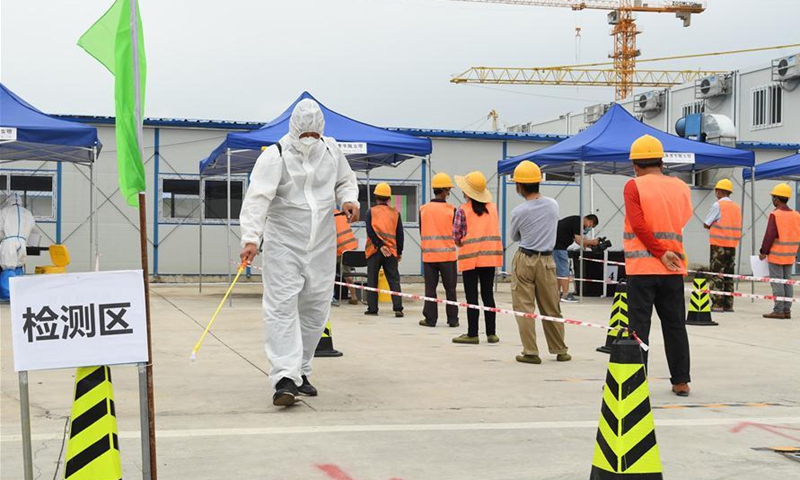Epidemic subsides in Beijing as city reports no new COVID-19 cases
By Liu Caiyu Source: Global Times Published: 2020/7/7 16:42:01

A staff member (L, front) disinfects a COVID-19 nucleic acid testing facility set up temporarily on a construction site in Haidian District of Beijing, capital of China, June 26, 2020. More than 1,750 construction workers in Beijing received COVID-19 nucleic acid tests on Friday. (Xinhua/Ren Chao)
Beijing is cautiously recovering from the wave of coronavirus cases centered around the Xinfadi wholesale food market, and is on the brink of downgrading its emergency response, observers said Tuesday, as the city reported no new COVID-19 cases for the first time in 26 days.
In contrast to previous weeks, when dozens of newly confirmed infections were reported daily, more people are walking outside and shopping, while body temperature checks are required at entrances to public places.
More people are also taking public transportation, with the return of long lines in subways and at bus stops. But people are still wearing masks and observing social distancing.
Wang Hufeng, a professor at the School of Public Administration and Policy of Renmin University of China, told the Global Times on Tuesday that Beijing is not totally safe yet.
"Zero newly confirmed infections are only a phased result, and intermittent cases can't be ruled out," Wang said, adding that there is no possibility of a large-scale epidemic rebound in Beijing.
Beijing's announcement of no new infections does not mean no risks, said Pang Xinghuo, a deputy head of the Beijing Center for Disease Control and Prevention on Tuesday.
As thousands of people are still under quarantine observation and the city has 31 asymptomatic infected cases under medical observation, new COVID-19 cases could be reported in the next week, she said.
Despite the improving situation, Beijing has yet to lower the city's emergency response from Level II, which was raised on June 16.
"Beijing is on the brink of downgrading its emergency response, which requires a gradual lifting of the city's restrictions. But even if the epidemic response level is lowered, that does not mean Beijing is absolutely safe," Wang said.
Beijing so far has only one high-risk zone: the Huaxiang sub-district in Fengtai district. Wang said the high-risk region is expected to lower its risk level within two weeks as long as there are no more new cluster infections.
Starting Tuesday, Beijing will gradually release about 74,000 quarantined people who were exposed to the Xinfadi market. More than 5,000 people will be included in the first batch, all of whom tested negative for COVID-19, Beijing's Fengtai district government said on Tuesday.
As another sign of an easing epidemic, the final disinfection of Beijing's Xinfadi wholesale market has been completed 25 days after it was closed.
The wave of cluster infections that recorded 335 local patients has gradually died down following an aggressive round of nucleic acid tests and decisive measures to restrict out-of-town travel, and locking down dozens of residential communities.
It will become a "new normal" in Beijing to conduct regular nucleic acid testing to maintain the city's epidemic prevention and control work, Beijing officials said Tuesday, adding the city will try its best to ensure testing quality and efficiency.
Newspaper headline: Beijing epidemic subsides in phased achievements
RELATED ARTICLES:
Posted in: SOCIETY